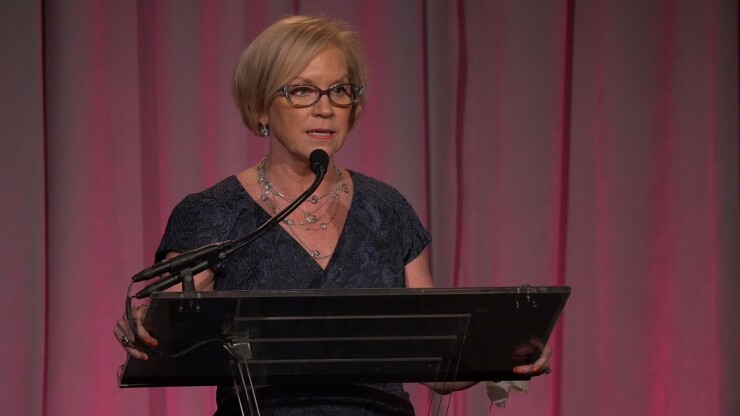As banks compete simultaneously with traditional peers, financial technology upstarts and big technology players
But the cherished startup
“There was a time where I used to say, we have to be like fintech and fail fast,” Bessant told the audience at the CB Insights' Future of Fintech conference on Wednesday in New York. “But the truth is we are still in the consumer and commercial trust business. It doesn’t make any sense, and it’s not a good shareholder proposition.
"We still have to stay aggressive from an innovation perspective, but we can’t get caught up in the trap of failing fast," she added. "That’s a luxury startups can take but we can’t.”
Banks must allow for process constraints and due diligence, Bessant said, while continually developing new tech. “There’s a lot of competition, and competition is good for innovation, and customers and clients,” she said.
In fact, the role of technology in banking has changed so much that is has become much larger than just an IT function, she added. Bessant herself had no prior tech experience before being named to her current post eight years ago; she had served as chief marketing officer and had headed several different lines of business as well.

“I’m not a technologist by training, but I know business,” she said. “And there’s more people coming into tech from different backgrounds, and the classic career path of the coder who moves up through the organization is changing. Even most of our app developers now don’t do 100% of the coding for the apps they create.”
Bessant now manages nearly half of the total employees at the $2.28 trillion-asset bank. If that seems like a lot of resources devoted to technology, it’s because Bank of America doesn’t look at tech as just another part of banking, she said, but rather as something integral to running the business.
“Tech is the business and the business is tech,” Bessant said. “Technology underpins the entire customer journey.”
Bessant acknowledged that while not all of her division is solely focused on tech — operations also includes some paper-based functions such as the billions of checks Bank of America processes each year and handling cash, which Bessant said “people still use in the trillions of dollars per day," — the bank has still become a prodigious developer of technology. B of A has become a powerhouse
One such recent innovation from the bank is the digital assistant Erica. Bessant said it is different from other virtual assistants “because of the time and effort we put in to natural language processing.”
“She literally understands what she’s being asked and can anticipate word strings and move with a speed of response almost as quick as people are asking questions,” Bessant added.
When it comes to artificial intelligence in general, Bessant said it has much potential in the industry, but banks must also plan closely how to use it. She said while AI can replace some manual functions currently done by humans, it shouldn’t replace those human employees altogether, but rather free them up to do tasks that add more value. As a caution, she said the industry should learn from the past, particularly how automation affected the auto industry and permanently replaced many jobs done by humans.
“It should not bring a decimation of jobs, but a change of tasks if done properly,” she said.
Though banks can’t innovate in exactly the same manner tech startups can, they don’t have to think like a legacy institution when it comes to technology, said Harit Talwar, who heads the Marcus division for Goldman Sachs. Goldman took a kind of outsider’s mentality when creating Marcus, he noted.
“We looked at what was happening, and consumers had multiple pain points and they didn’t trust financial services companies to be on their side,” he said. “We were the only large bank which didn’t have a consumer business; that was to our advantage because it meant we could look at things with fresh eyes. We had no legacy distribution systems or business models. And unlike fintech startups, we are the bank and proud to be a bank — we have a balance sheet and a DNA of risk management and building platforms at scale. So we’re unique among fintechs and banks.”
Goldman initially launches a loan product with Marcus because “the credit card industry had a lot of bad practices. We’re not against credit as a product, but [had issues with] how the industry is being run today.”
As Marcus continues to evolve and offer new products, Talwar said it will continue to take that hybrid approach of being not quite fintech and not quite bank.
“We’re not trying to replicate yet another fintech or another consumer bank,” he said. “We think of ourselves as a startup with 150-year-old DNA.”





